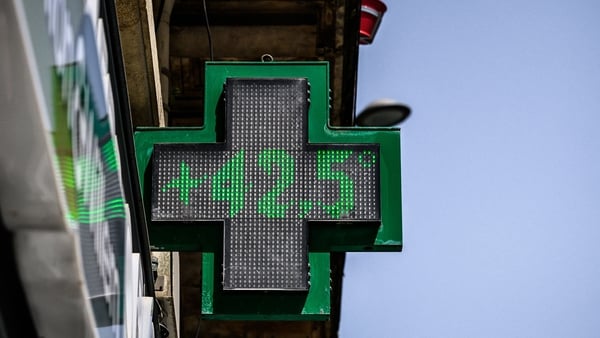Taoiseach Micheál Martin has said a pay deal offered to public sector workers is a fair one and that he hopes it will be accepted by union members.
Public sector unions are to ballot their members on whether to accept a 6.5% pay increase over two years.
The proposal was tabled by the Workplace Relations Commission this morning following the conclusion of public sector pay talks between unions and the Government.
The package would see pay increases of 3% backdated from 2 February 2022, 2% from 1 March 2023 and 1.5% or €750, whichever is the greater, from 1 October 2023.
The minimum payment of €750 is designed to support lower paid public servants and means the package would be worth 8% to a worker earning €25,000 a year and 7% to a person on €37,500 a year.
This would come on top of a 2% increase already included in the existing public sector pay agreement, 'Building Momentum'.
Mr Martin said he welcomed the agreement and paid tribute to participants for their constructive engagement.
He said that the Budget and cost-of-living package at the end of September will represent further strands of the Government's approach to alleviating pressures.
The Public Services Committee of the Irish Congress of Trade Unions met this morning to consider the proposals and decided that individual unions should now consult members, through ballots and other means, on the package in advance of a collective decision on whether to accept or reject the deal.
We need your consent to load this rte-player contentWe use rte-player to manage extra content that can set cookies on your device and collect data about your activity. Please review their details and accept them to load the content.Manage Preferences
This will take place at a further union meeting on Friday 7 October, where voting will be weighted to reflect the number of public servants that each union represents.
ICTU President Kevin Callinan said he believed the outcome was the best that could currently be achieved through negotiations.
"We'll now be explaining this package to union members, who will have the final say in ballots. Neither side has achieved all it sought, but this package is a significant improvement on the pay terms of Building Momentum, and it is worth more to those who need it most.
"This underlines the importance of the unions' decision to invoke the review clause in the current agreement.
"Over the past weeks, Minister [Michael] McGrath and his Government colleagues have repeatedly promised to supplement pay measures with other cost-of-living supports through the Labour-Employer Economic Forum (LEEF) process and the forthcoming Budget.
Read more: Pay agreement reached but not yet a done deal
"Workers will now expect delivery on that promise. A Government failure to deliver will certainly impact the ballots that will shortly get under way," Mr Callinan said.
SIPTU Deputy General Secretary John King said the Public Services Committee was also recommending that planned industrial action ballots be suspended while unions consult on the proposed pay deal.
Following an emergency meeting of the Irish Nurses and Midwives Organisation's executive council, the union has suspended balloting for industrial action, according to general secretary Phil Ní Sheaghdha.
"The INMO Executive Council will reconvene again on Wednesday afternoon to further consider the offer that was brokered and decide how this issue will be put before members in terms of a ballot," Ms Ní Sheaghdha added.
Minister for Public Expenditure and Reform Michael McGrath thanked the officials from his own department, unions, staff associations and staff at the WRC for their work.
We need your consent to load this rte-player contentWe use rte-player to manage extra content that can set cookies on your device and collect data about your activity. Please review their details and accept them to load the content.Manage Preferences
"All parties have made a sincere and sustained commitment to reach agreement in very difficult circumstances," Mr McGrath said.
Later, speaking on RTÉ's News at One, Minister McGrath said the Government wanted a deal that was affordable and sustainable for taxpayers.
"At all times our aim was to achieve a fair deal and strike the right balance between acknowledging the impact of inflation and not to chase inflation," he said.
Mr McGrath said that the Government was satisfied that it now has the capacity and framework to modernise public services and make them more efficient, and he expects the reforms and changes to work practices in response to the Covid-19 pandemic to be continued and extended as part of the agreement.
Public sector pay talks resumed at noon yesterday and continued through the night with a conclusion reached shortly after 6am.
The last round of talks ended without agreement in June after unions and staff associations rejected a 5% pay increase over two years saying it fell far short of inflation.
General Secretary of the Association of Garda Sergeants and Inspectors Antoinette Cunningham said the proposals are "the best that could have been achieved during these challenging negotiations".
"We have seen inflation continue to rise in recent weeks, and we are fully aware of the financial pressures that our members are under and the challenging economic environment we are in," she said.
"These proposals will go some way to meeting those challenges," she added.
Elsewhere, the chief executive of the employers' group ISME said that the rate that came out of the talks was "not justifiable".
Speaking on RTÉ's Drivetime, Neil McDonnell said that ISME did not feel these types of pay increases were appropriate in the context of the crisis.
He said ISME understands the demand for pay increases in light of inflation, but with costs expected to rise this winter, they must prioritise bridging the gap for those who are not going to be able to afford increases.
Those people had to be higher up than public sector pay, he added.
On the same programme, SIPTU Deputy General Secretary John King said he did not accept that pay increases were not justifiable.
He said Minister McGrath and the Taoiseach had acknowledged that the agreement was sustainable and affordable, and leaves money for a cost-of-living budget in September.
The economic crash was not down to payment of public sector workers, he said.
Additional reporting Eileen Magnier






